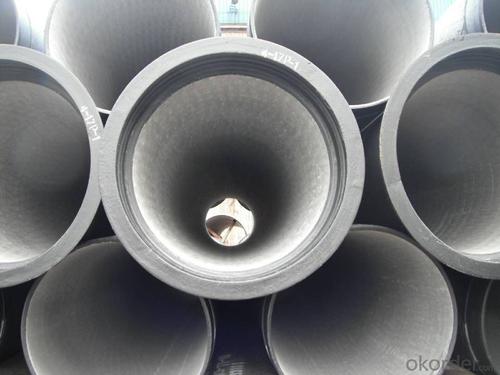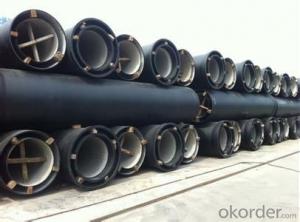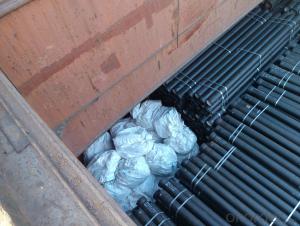DUCTILE IRON PIPE DN1200 K9/C
- Loading Port:
- China Main Port
- Payment Terms:
- TT OR LC
- Min Order Qty:
- -
- Supply Capability:
- -
OKorder Service Pledge
OKorder Financial Service
You Might Also Like
Specification:
1) The standard of pipe: ISO2531:1998, K9
2) Effective length: 6m
3) Inner cement line: Portland cement line as per ISO4179
4) Zinc coating: at least 130g/m2 as per ISO8179
5) Bitumen painting: at least 70um as per ISO8179
6) With 100% quantity of NBR ring, or SBR ring, or EPDM ring as per ISO4633
7) DN80mm-800mm
8) High strength, lighter than grey iron, good corrosion resistance, no furring, small flow resistance, easy fixing, long life tome about 100 yeas
9) Produced by Hangzhou chunfeng machine
10) Checked by automatic inspection equipment
11) Composition:
Chemical composition | |||
Chemical composition | Ductile Cast Iron Pipe (%) | Grey iron pipe (%) | Steel pipe (%) |
C | 3.5-4.0 | 3.2-3.8 | 0.1-0.2 |
Si | 1.9-2.6 | 1.4-2.2 | 0.15-0.4 |
Mn | 0.15-0.45 | 0.4-0.6 | 0.3-0.6 |
P | ≤0.06 | ≤0.3 | 0.02-0.03 |
S | ≤0.02 | ≤0.1 | 0.02-0.03 |
Mg | 0.03-0.06 |
|
|
12) Feature:
Mechanical properties | |||
| Ductile Cast Iron Pipe | Grey Iron Pipe | Steel Pipe |
Tensile Strength(Mpa) | ≥420 | 150-260 | ≥400 |
Yield Strength(Mpa) | ≥300 | No Confirmation | No Confirmation |
Bending Strength(Mpa) | ≥590 | 200-360 | ≥400 |
Elongation (%) | ≥10 | Neglected | ≥18 |
Brinell Hardness(HBS) | ≤230 | ≤230 | About 140 |
13) T type mechanical joint
14) Packing: in bulk or container
- Q: Can ductile iron pipes be used for water distribution networks in rural areas?
- Ductile iron pipes are suitable for water distribution networks in rural areas due to their high strength and durability. These pipes are known for their ability to withstand external loads and pressure, making them ideal for underground installations. Additionally, they have excellent resistance to corrosion and can withstand harsh environmental conditions or agricultural activities. In rural areas, where the water distribution network may face challenging conditions, ductile iron pipes offer a reliable solution. They are less likely to crack or leak, ensuring a continuous water supply for rural communities. Moreover, these pipes have a long service life, often exceeding 100 years, making them a cost-effective choice that requires minimal maintenance and replacement. However, it is crucial to consider other factors such as the availability of ductile iron pipes, installation costs, and the technical expertise required for installation and maintenance. Local regulations and standards should also be followed to ensure compliance and safety. Overall, ductile iron pipes can provide a suitable and dependable option for water distribution networks in rural areas. They offer a long-lasting and efficient solution for delivering clean water to communities.
- Q: Are ductile iron pipes suitable for use in chemical storage tanks?
- Ductile iron pipes are not suitable for use in chemical storage tanks. While ductile iron pipes have excellent mechanical properties, including high tensile strength and impact resistance, they are not resistant to corrosion caused by various chemicals. Chemical storage tanks require materials that can withstand the corrosive properties of the stored chemicals to ensure the safety and integrity of the tank. Therefore, materials such as fiberglass-reinforced plastic (FRP), stainless steel, or high-density polyethylene (HDPE) are commonly used for chemical storage tanks due to their superior corrosion resistance. It is crucial to select the appropriate material for chemical storage tanks to prevent leaks, contamination, and potential hazards.
- Q: What is the difference between spheroidal graphite cast iron QT400-15 and QT400-15A? What does the A mean later?
- This should be said in front of the material, and later add A, should refer to the grade
- Q: Can ductile iron pipes be used for wastewater pumping stations?
- Indeed, wastewater pumping stations can utilize ductile iron pipes. With their remarkable strength and durability, ductile iron pipes are well-suited for transporting wastewater and effectively managing the immense pressures and corrosive properties of sewage. Furthermore, the smooth interior surface of ductile iron pipes prevents blockages and facilitates the efficient flow of wastewater. Moreover, these pipes exhibit resistance towards external forces like soil displacement or heavy vehicular movement, thereby establishing themselves as a dependable option for wastewater pumping stations.
- Q: Are ductile iron pipes more resistant to breaks and cracks than other pipe materials?
- Ductile iron pipes generally possess higher resistance to breaks and cracks compared to other pipe materials. Ductile iron, a form of cast iron treated with magnesium, exhibits increased flexibility and reduced brittleness. This enhanced flexibility empowers ductile iron pipes to endure significant pressure and external loads without incurring damage. In contrast to widely-used pipe materials such as PVC, HDPE, or steel, ductile iron pipes excel in strength and durability. They boast higher tensile strength, enabling them to withstand greater forces and pressures without succumbing to failure. Additionally, ductile iron pipes demonstrate superior impact resistance, reducing the likelihood of cracking or breaking when subjected to sudden impacts or external loads. Another advantage of ductile iron pipes lies in their ability to resist corrosion. The material naturally repels rust and remains unaffected by harsh environmental conditions, making it ideal for underground installations or areas with corrosive soils. This corrosion resistance further contributes to the pipes' longevity and overall integrity. Furthermore, ductile iron pipes possess a longer lifespan compared to other pipe materials. They are designed to endure for multiple decades, often exceeding 50 years, with minimal maintenance. This prolonged lifespan decreases the necessity for frequent replacements, resulting in time and cost savings in the long term. However, it is crucial to acknowledge that no material is entirely immune to damage or failure. Proper installation, maintenance, and adherence to industry standards and guidelines are imperative to ensure optimal performance and longevity of ductile iron pipes. Regular inspection and monitoring should also be carried out to identify potential issues or signs of deterioration, facilitating timely repairs or replacements.
- Q: How does ductile iron pipe perform in areas with high groundwater contamination?
- Ductile iron pipe performs well in areas with high groundwater contamination due to its corrosion-resistant properties. It can withstand the corrosive effects of contaminated water and maintain its structural integrity over time, making it a reliable choice for such environments.
- Q: Can ductile iron pipes be used for submarine pipelines?
- Submarine pipelines can indeed utilize ductile iron pipes. Ductile iron, celebrated for its robustness and durability, proves suitable for a range of applications, including those submerged underwater. For decades, ductile iron pipes have been successfully employed in the construction of submarine pipelines. They possess the ability to endure the harsh conditions prevalent in underwater environments, such as corrosion, pressure, and shifting seabeds. Furthermore, ductile iron pipes display exceptional resistance to external loads, rendering them ideal for submarine pipelines that bear the weight of water and potential impacts. However, it remains imperative to consider factors such as coating, cathodic protection, and proper installation techniques to ensure the long-term performance and integrity of the submarine pipeline.
- Q: What are the differences between cast iron pipes W and A?
- W type socket cast iron drainage pipe made of stainless steel flexible clamp connection in the construction of the installation; A type cast iron drainage pipe with flexible flange and sealing ring connection in the construction of the installation; B type cast iron drainage pipe comprehensive advantages of W type and A type cast iron drainage pipe, straight pipe part adopts W type bearing mouth of pipe, pipe fittings with double flange structure;
- Q: Can ductile iron pipes be used for gravity flow applications?
- Yes, ductile iron pipes can be used for gravity flow applications. Ductile iron pipes are known for their strength, durability, and flexibility, making them ideal for various applications including gravity flow systems. They are commonly used in water and wastewater systems, storm drainage systems, and other gravity flow applications where the pipes need to withstand high internal and external pressures. Ductile iron pipes are able to handle the weight of the flowing fluid without the need for additional support, making them a reliable choice for gravity flow applications. Additionally, their corrosion resistance properties ensure long-term performance in underground or exposed environments. Therefore, ductile iron pipes are suitable and commonly used for gravity flow applications.
- Q: Do ductile iron pipes have inner enamel?
- If the market supply is indeed difficult, can be done by the owners, Design Institute of supplier relationship; if the design institute requires it to provide products can persist in wilfully and arbitrarily, the available information (if the market can not supply, design a hair ah).
Send your message to us
DUCTILE IRON PIPE DN1200 K9/C
- Loading Port:
- China Main Port
- Payment Terms:
- TT OR LC
- Min Order Qty:
- -
- Supply Capability:
- -
OKorder Service Pledge
OKorder Financial Service
Similar products
Hot products
Hot Searches
Related keywords



























